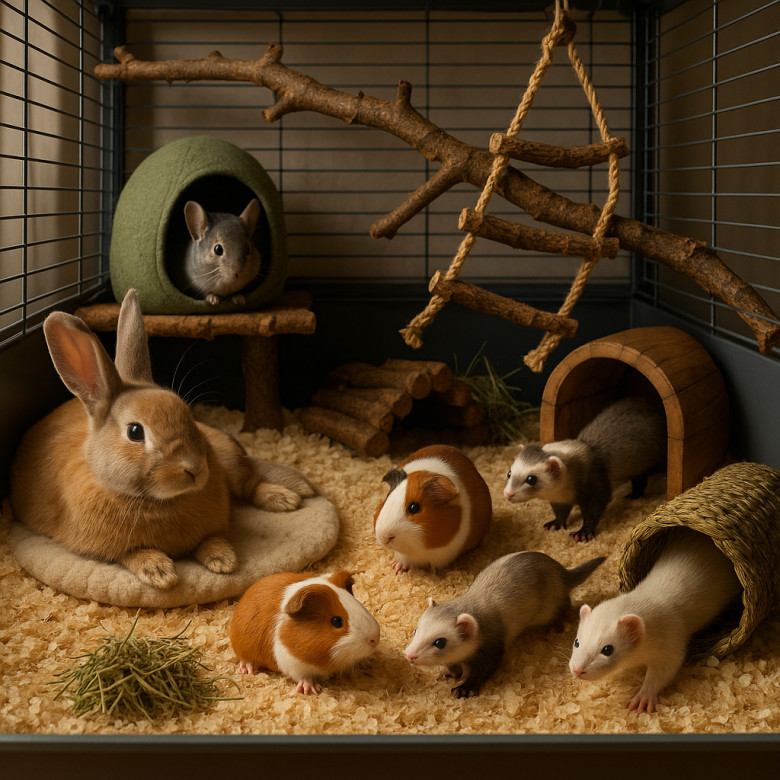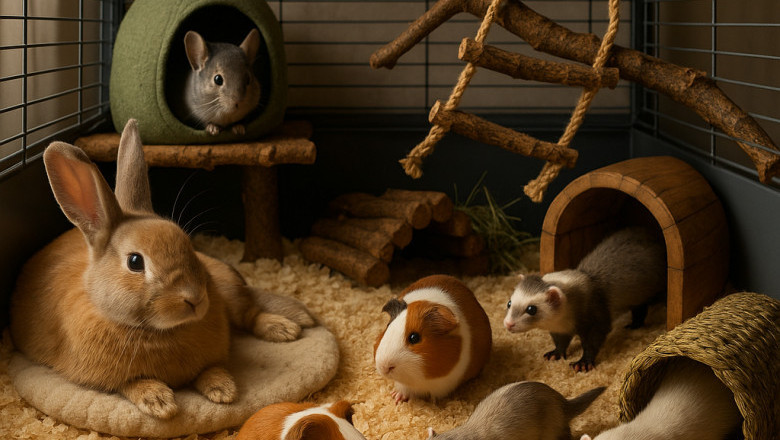views
Small pets deserve just as much love and thoughtful care as dogs or cats—and that starts with choosing the right small animal cage. For pet parents in the USA, the emphasis today is shifting toward durable, safe, and comfort-oriented enclosures that enhance the overall well-being of their furry companions. Whether you're caring for a rabbit, guinea pig, ferret, chinchilla, or hamster, their environment matters—and in this guide, you'll discover everything you need to choose the best small animal cages that are durable and comfortable.
Why Comfort Matters in a Small Animal Cage
Comfort is not a luxury—it's a necessity for small animals. These pets often have sensitive respiratory systems, need ample space to move around, and require specific materials to prevent injury or stress. A cage that lacks ventilation, space, or easy access to food and water can lead to behavioral issues, obesity, or other health problems.
In fact, according to a 2023 survey by the American Pet Products Association (APPA), over 68% of small pet owners reported that their pets had better behavior and health when housed in a well-ventilated, appropriately sized cage. This makes it clear: cage comfort isn't optional; it’s critical.
What Makes a Small Animal Cage “Durable”?
Durability isn’t just about lasting long—it’s about safety and reliability. A durable small animal cage is made with chew-resistant materials, rust-proof wiring, and firm bases that can support your pet’s weight and activity. Here are a few factors to check when determining cage durability:
- Material quality: Look for powder-coated steel wire or reinforced plastic bases.
- Chew resistance: Significant for rodents like rats, gerbils, and hamsters.
- Weather resistance: For cages used outdoors or in fluctuating temperatures.
- Locking mechanisms: Secure latches and doors to prevent escapes.
Key Features to Look for in the Best Small Animal Cages
When shopping for the best small animal cages, make sure to prioritize the following features:
1. Adequate Space
Small animals may be small in size, but not in spirit. Rabbits, ferrets, and guinea pigs especially need room to hop, explore, and burrow. A minimum recommended size for a guinea pig cage, for example, is 7.5 square feet for one pig, but larger is always better.
2. Easy Access and Cleaning
Top-opening cages or those with multiple side doors make it easier to interact with your pet and clean their space. Removable trays also help with quick cleaning, reducing odor, and maintaining hygiene.
3. Proper Ventilation
Poor airflow can lead to respiratory infections. Wire cages allow for better air circulation than glass or plastic aquariums, which can trap moisture and bacteria.
4. Multiple Levels or Platforms
Ferrets, rats, and chinchillas enjoy climbing and exploring. Multi-level cages with ramps and platforms stimulate activity and reduce boredom.
5. Secure and Safe Design
Rounded edges, escape-proof locks, and non-toxic paints or coatings are essential safety features. Avoid cages with bars that are too widely spaced—small pets can squeeze through or get stuck.
Best Small Animal Cage Types for Different Pets
Let’s explore which cage types work best based on specific small animals:
🐹 Hamsters and Gerbils
- Ideal Cage: Plastic modular cages or wire cages with a deep base for burrowing.
- Recommended Feature: Tubes and tunnels for stimulation.
- Common Cage Size: At least 450 square inches of floor space.
🐰 Rabbits
- Ideal Cage: Large metal cages or x-pens with solid flooring.
- Recommended Features: side door for easy in and out, and easy-to-clean flooring.
- Common Cage Size: 8 square feet minimum + exercise run.
🐭 Rats and Mice
- Ideal Cage: Tall cages with platforms and hammocks.
- Recommended Feature: Narrow wire spacing and ramps.
- Common Cage Size: 2 cubic feet per rat.
🐹 Guinea Pigs
- Ideal Cage: Wide, flat-bottom cage with bedding.
- Recommended Feature: No wire flooring, open tops.
- Common Cage Size: 7.5+ square feet for 1 pig.
🐿️ Chinchillas and Ferrets
- Ideal Cage: Multi-level wired cages.
- Recommended Feature: Metal ramps, chew-proof construction.
- Common Cage Size: 3 cubic feet minimum.
Tips to Make Your Small Animal Cage More Comfortable
You’ve bought the right small animal cage—now here’s how to make it feel like home:
1. Use the Right Bedding
Opt for natural, dust-free bedding like paper-based products or kiln-dried aspen shavings. Avoid cedar or pine, which can irritate the respiratory system.
2. Provide Hideouts and Shelters
Every small pet needs a safe corner or shelter to retreat to. Whether it’s a tunnel, dome, or log, hiding spaces reduce stress and promote better behavior.
3. Enrich with Toys
Chew toys, tunnels, platforms, and climbing ropes keep your pet engaged. Rotate them every few weeks to maintain interest.
4. Maintain a Clean Environment
Spot clean daily and deep-clean weekly. Hygiene affects not only comfort but health and odor levels in your home.
5. Regulate Temperature and Light
Avoid placing cages near windows or vents. Consistent temperature and low-stress lighting help keep pets calm.
Small Animal Cages and American Pet Trends (2024–2025 Update)
The USA pet supplies market is booming, and small animal accessories are no exception. According to Statista’s 2024 report on the U.S. pet product market, sales of small animal supplies rose by 12% year-over-year, with cages and habitats leading the category.
New innovations in the market include modular cage systems and eco-friendly designs. Brands like Kaytee, Prevue Pet, and Midwest Homes have started offering cages made from recycled plastic and environmentally conscious packaging.
Additionally, Veterinary Practice News (April 2024) highlights that veterinarians now encourage larger enclosures for small pets due to rising concerns over obesity and stress in confined environments. These guidelines push pet parents to invest in more spacious and interactive housing.
Top 3 USA-Recommended Small Animal Cage Brands
🐾 1. MidWest Homes for Pets
- Sturdy, affordable, and comes with accessories.
- Great for guinea pigs and rabbits.
🐾 2. Kaytee CritterTrail
- Modular and colorful designs for hamsters.
- Fun tunnels, exercise wheels, and nesting zones.
🐾 3. Prevue Pet Products
- Heavy-duty, tall cages perfect for ferrets and chinchillas.
- Long-lasting and easy to assemble.
5 FAQs About Small Animal Cages
1. What is the best small animal cage for beginners?
A wire cage with a plastic base is ideal for beginners—it’s easy to clean, ventilated, and durable. MidWest’s Guinea Habitat or Kaytee’s Basic Cage models are good starting points.
2. How often should I clean a small animal cage?
Spot clean daily and do a full cage clean weekly. Deep cleaning helps prevent odor and keeps your pet healthy.
3. Can multiple small pets share one cage?
Some species like guinea pigs or rats are social and enjoy sharing, but others, like hamsters, may prefer solitude. Always research species compatibility before cohabitation.
4. Are glass tanks good small animal cages?
Glass tanks are poor for ventilation and aren’t ideal for most small pets. Wire cages are a better choice for airflow and accessibility.
5. What should I avoid in a small animal cage?
Avoid wire flooring (can hurt feet), toxic paints or coatings, small doors, and poorly secured latches. Comfort and safety should always come first.
Final Thoughts: Investing in Comfort with the Right Small Animal Cage
Choosing the right small animal cage is more than a purchase—it’s a promise to care for your pet's health, happiness, and daily quality of life. By investing in a durable, well-ventilated, and thoughtfully designed enclosure, you're ensuring your small pet gets the physical comfort and mental stimulation they deserve.
As trends shift in the USA pet market toward enrichment and holistic well-being, it's the perfect time to upgrade to the best small animal cages tailored for comfort. Whether you're welcoming a new furry friend or improving the life of one you've loved for years, start with the space they call home.
And remember—pet care isn’t just about feeding and cleaning; it’s about understanding what makes our companions feel safe, loved, and at ease.















Comments
0 comment